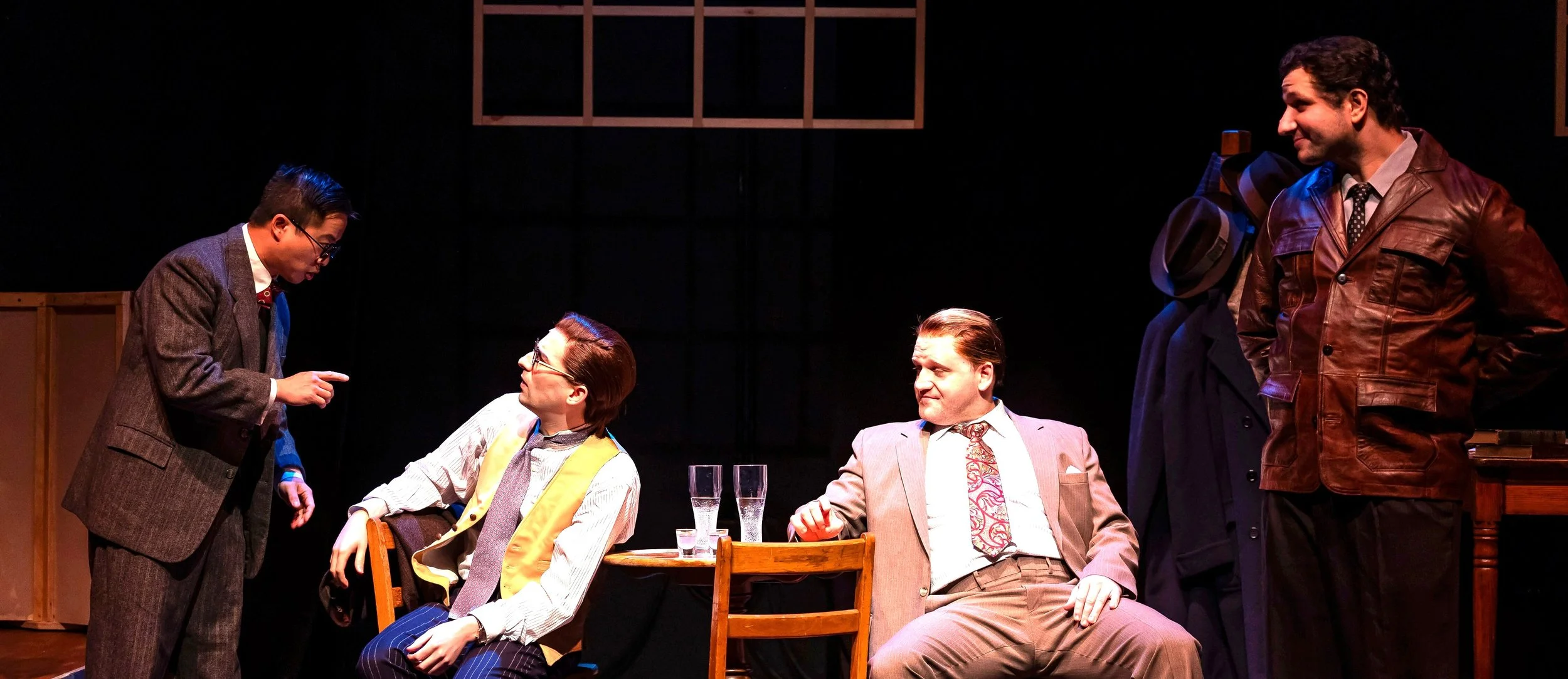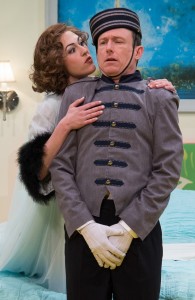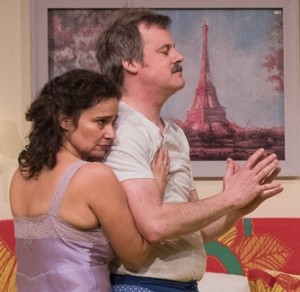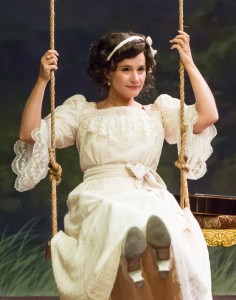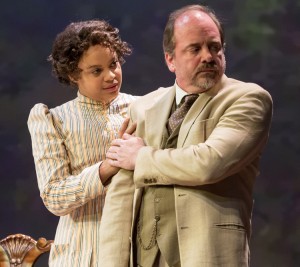“Power corrupts” is a global, historical truism, possibly even more so when conquerors ensnare the vanquished to do their dirty work. Such was the case for Jews in the mid–20th century in Europe’s Nazi-controlled ghettoes. The Nazis often appointed Jewish leaders to decide on the people to be deported—often a death sentence. The Jewish-run panels were called Judenrats. In Leslie Epstein’s King of the Jews, adapted from his novel of the same name, an ethnic German Nazi enforcer in Łódź, Poland, authorizes a group of Jews to select fellow Jews for deportation.
Vive ‘Le Dingdong’!
Director Hal Brooks unbridles five actors in The Dingdong, Mark Shanahan’s updated adaptation of Georges Feydeau’s 1896 farce Le Dindon. He propels it even further into the absurd by having those five actors bring to charming, boisterous and nuanced life 12 distinct characters.
The farce begins with Lucy Vatelin (Rachel Botchan), a married woman, attempting to slam the door on an overzealous suitor, Pontegnac (Bradford Cover). With Pontegnac’s arm and leg precariously lodged in the door, she is leaning against it, insisting he go away. “Everyone this side of the Seine heard you shout that you wanted to make passionate love to me!” she complains loudly, while screaming for her husband to save her. Unfortunately, Pontegnac is an old friend of her husband (Chris Mixon).
Lucy has another suitor, Redillon (Brad Heberlee), who calls on her as well. With Vatelin out of the room taking a business call, Redillon and Pontegnac square off. Meanwhile, Mme. Pontegnac (Kelley Curran), suspecting her husband's infidelity, has followed him to the Vatelins’ home, where Lucy, worn down, makes a pact with Pontegnac, agreeing to have an affair with him if her husband should ever be unfaithful. Pontegnac knows full well he hasn't been.
The first-act characters include Fabiola (also Curran) as Vatelin’s Italian lover, who has traveled to Paris (with her Hungarian husband) to find him and profess her love. The second act introduces even more, at The Hotel Ultimus, with doors slamming, a 17-year-old bellboy and a Parisian policeman (both played by Heberlee), luggage mix-ups, a French chambermaid, an old, practically deaf woman (Botchan) with uncontrollable flatulence, and a New Yorker named Mandy (Curran).
Two multifaceted performers capture the pure essence of farce in their multiple roles. Kelley Curran bursts onto the stage as the epitome of a sophisticated, bold Frenchwoman and shortly after reappears as an Italian lover with all the bravado of an early Sophia Loren. Act II opens with Curran as Mandy and, only to outdo herself, she closes the play as a fetching French maid. Wigs, costumes and shoes take an actor only so far in a role—Curran is each character.
Heberlee is also a delight, energetically embodying three characters—the flamboyant, sex-driven Redillon (who is a doppelgänger to Feydeau), the bellboy and the policeman. It is his role as Redillon in Act I, at one moment writhing on the floor and professing his love to Lucy, and in the next attempting to explain to Vatelin why he is on the floor (he is cleaning, after all) that is the most endearing. During the standoff with Pontegnac the actors pose like two preening cocks in the farmyard, arguing who is the greater lothario (“I would never discuss matters of intimacy with another man’s wife”).
Cover appears to have the most difficulty playing multiple characters, relying on his best Tim Conway impression, at times shuffling or gasping before each line. Act I finds him and Botchan in awkward and unnecessary movements with odd pacing.
Designing a 1938 French townhouse, Sandra Goldmark uses striking black and white striped walls, a sunrise-yellow floor, and tone-on-tone fabric chaises for Act I. Lighting designer Mike Inwood adds a wonderful layer of sunlight streaming through a lattice window. In Act II, at the Hotel Ultimus, there are bright green and yellow panels with a matching headboard and bedspread. A brief set change and the scene becomes the Honeymoon Suite of the Hotel Rue Cromartin, where the stagehands, decked out à la Marcel Marceau, replace the fabric with bright red floral patterns, as well as a painting of the Eiffel Tower.
Working in concert with the set designer, costumer Amy Clark mixes and matches contrasting colors and patterns. Her attention to detail with smart wigs and colorful hats, down to gartered socks and Redillon’s man-about-town look, is like pure icing on a Pimm’s Cup cupcake from Prohibition Bakery.
George Feydeau is one of the most famous writers of bedroom farce, and Mark Shanahan’s adaptation is a remarkable homage. Witty banter, along with exaggerated physicality, are at the heart of The Dingdong. Even the most pursed lip might be cajoled to laugh out loud.
Performances run through May 15 at the Pearl Theatre, 555 West 42nd St., (212) 563-9261. Tickets are $65 regular, $85 premium ($40 members, $20 student rush, $20 Thursday rush). Visit pearltheatre.org for specific dates and times.
A Chilly Romance
Shakespeare’s late play The Winter’s Tale has always presented directors with difficulties, notably that Leontes, the Sicilian king who dominates the first half, becomes insanely jealous of the friendship of his pregnant queen, Hermione, and his best friend, Polixenes, king of Bohemia, some nine months after Polixenes has arrived for a visit. Indeed, on the eve of Polixenes’ departure, Leontes determines to kill his friend, who escapes. When Hermione delivers, Leontes orders the death of the newborn. He then learns of her innocence just as her death is reported.
Michael Sexton’s production for the Pearl Theatre Company is stuffed with ideas, to mixed effect. In a first scene whose meta-theatricality is echoed later, the actors saunter on and tacitly acknowledge the audience before getting down to toasts, card tricks, and pouring Scotch. In short order, Peter Francis James’s well-spoken Leontes begins to voice his suspicions of the infidelity of Hermione (Jolly Abraham). James stands stiffly with his hands in his pockets, seemingly tight with emotion. If James cannot quite make Leontes’ jealousy credible, he suggests one of those people who snap suddenly and inexplicably kill their families. He tries to enlist his chief counselor, Camillo (an authoritative Tom Nelis), to poison Polixenes (Bradford Cover), but Camillo warns Polixenes and joins him in his escape.
Sexton has made judicious cuts, and some of his ideas are nifty. How does one approach Shakespeare’s most famous stage direction, Exit, pursued by a bear? It occurs when the courtier Antigonus (Dominic Cuskern) takes Hermione’s infant to the woods to dispose of it. Sexton’s solution is to have a visible attack and a stylish feeding frenzy. As one actor holds up a mounted bear’s head, several other actors, clad in fur coats, move as in a choreographed Noh drama and disembowel Antigonus (red cloths fly into the air).
Still, there's a disconcerting tricksiness to everything. Why does Bradley King (with the director’s blessing, surely) suddenly illuminate the actors as if they were in a 19th-century melodrama? Or a 1940s film noir? When the Shepherd enters, the lights go up, and his scene starts from the audience for no apparent reason.
But a closet door serves as an antechamber to the court, a prison cell, an actual closet, and later a bizarre exit for the comic rascal Autolycus (Steve Cuiffo). At times one longs for an oral description of the setting akin to those supplied by the mechanicals in A Midsummer Night’s Dream: “In this same interlude it doth befall/That I, one Snout by name, present a wall/And such a wall as I would have you think/That had in it a crannied hole or chink…”
It has often been difficult to spark interest in the wooing of the grown Perdita (Imani Jade Powers) by Polixenes’ son Florizel (James Udom), and the actors here don’t overcome the problem. But Rachel Botchan as Hermione's lady-in-waiting Paulina, who becomes the conscience of the reformed Leontes, is excellent.
The final scene, in which Hermione’s statue comes to life and is reunited with a repentant Leontes, is written to produce sniffles at a minimum. Here, Hermione appears without "statue" makeup, as if she's just a woman standing still. There's no magic, no wonder or warmth, and the scene is played so lethargically, to a lightly plunked guitar, that the climax dwindles away. It’s a shame that a production that often wrestles interestingly with this tragicomedy should end so weakly.
Evening performances of The Winter's Tale are 7 p.m. on Tuesdays and 8 p.m. Thursday through Saturday. Matinees are at 2 p.m. Wednesdays, Saturdays, and Sundays through March 15. Tickets may be purchased by visiting pearltheatre.org or calling (212) 563-9261.
Vanya @ 11th Avenue
The Pearl Theatre Company, which occupies a fine modern facility on West 42nd Street near 11th Avenue, has selected Anton Chekhov's Uncle Vanya, in a translation by the late Paul Schmidt, to open its 2014–15 season. Subtitled “Scenes from Country Life,” this comedy—or, rather, this special, melancholy kind of comedy—is one of four major plays the dramatist wrote near the end of his relatively short life.
The characters of Uncle Vanya are recognizable in their frustration and disappointment; their bickering and folly are readily believable. Though short on plot, the text is rich in dialogue and subtext. It's a beloved and influential play, constantly revived all over the world. Recent American works such as Vanya and Sonia and Masha and Spike by Christopher Durang (the most produced script in professional theaters around the U.S. this season, according to American Theater magazine) and The Country House by Donald Margulies (newly opened at Broadway's Friedman Theatre) owe it a conspicuous debt. When Uncle Vanya returns to New York, attention must be paid.
The play takes place on a country estate run by Sonya (Michelle Beck) and her maternal uncle (Chris Mixon), the title character. Sonya's father, Alexander Serebriakov (Dominic Cuskern), is a vainglorious scholar whose career and vitality are winding down. Serebriakov's luxurious city existence has been financed by the hard work and frugal living of Sonya and Vanya on the farm. Arriving in the country for an open-ended stay, the professor and his much younger wife, Yelena (Rachel Botchan), interrupt the rhythms of country life. Their selfish, inconsiderate ways exacerbate resentments that have festered in the family for years; and Yelena's flirtatious allure leads to intrigue (or attempts at intrigue) and emotional havoc among males in the vicinity, especially Vanya and a family friend, Dr. Astrov (Bradford Cover).
The Pearl's production, directed by company artistic director Hal Brooks, is exquisite to behold. With movable pillars and fast traveling curtains, scenic designer Jason Simms transports the action efficiently from one room to another. A backdrop in soft colors, revealed when actors sweep the upstage curtains aside, brings the Russian countryside on stage; and Seth Reiser's expertly modulated lighting lends a sense of time passing from day to night and back to day at a languid pace appropriate to Chekhov.
This Uncle Vanya has no shortage of capable actors. Robin Leslie Brown brings intelligence and a light touch to the role of Marina, the old nurse who soothes shattered nerves and offers a long view of life. Cover's interpretation of Dr. Astrov is complex and arresting; his speech about reforestation is appropriate to the play's 19th-century setting yet sounds like something that might have been delivered at United Nations Climate Summit 2014 last month.
Mixon makes Vanya's disillusion palpable in the first two acts; but he plays the late scenes in a manic fashion that's anathema to Chekhov’s subtle brand of comedy and, at times, reminiscent of 1970s television sitcom. Other promising performances—Beck, Brad Heberlee as a neighbor nicknamed Waffles, and Carol Schultz as the foolish mother of the professor’s deceased first wife—suffer from direction that squeezes a sort of hilarity out of the script rather than trusting the playwright’s rueful humor. Botchan strikes the appropriate balance of insouciance and formidable stage presence for her role; but this Yelena seems to have wandered onto the Pearl stage from a play of later vintage than Uncle Vanya and from a different country than the other characters.
For a number of years, the Pearl has been one of the few companies in New York City consistently performing the so-called classical repertory of Western drama. The troupe’s tagline is “defining classics for New York,” and its work, whether up or down, is worth following. Uncle Vanya doesn't represent the Pearl anywhere near the top of its form; but next month the company, in tandem with the Gingold Theatrical Group, will present George Bernard Shaw's Major Barbara, directed by David Staller. If Major Barbara has the style, pace, and Shavian spirit of last season's You Never Can Tell, audiences will undoubtedly forget the shortcomings of Uncle Vanya and may even line up to renew their Pearl subscriptions early.
Uncle Vanya is playing through Oct. 12 at the Pearl Theatre Co. (555 West 42nd St.). Running time 2 hours, 20 minutes with intermission. Performances are Tuesday at 7 p.m.; Wednesday, Saturday and Sunday at 2 p.m.; and Thursday–Saturday at 8 p.m. Tickets are $65, senior $39, student rush $20, Thursday rush $20, and may be purchased at pearltheatre.org or by calling 212-563-9261.



